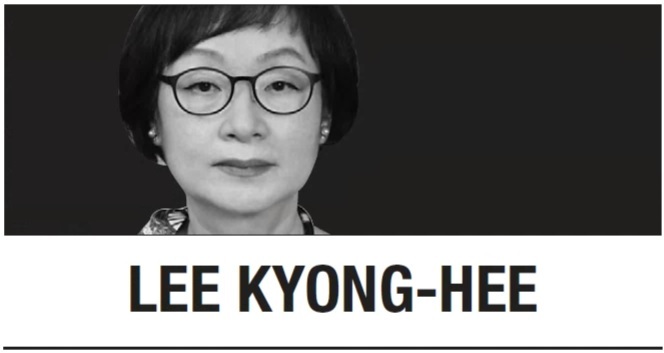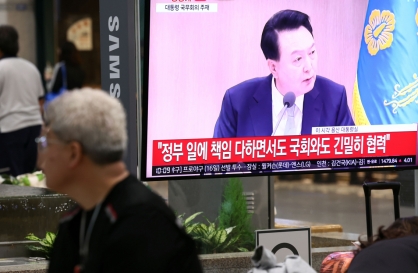[Lee Kyong-hee] Chanel jacket, bloated resume -- what else?
By Korea HeraldPublished : April 14, 2022 - 05:30

Hearing the joke, President Kim laughed heartily. He apparently understood it was related to his wife, Lee Hee-ho, whom he cherished openly for standing steadfast beside him. The couple’s time in the Blue House came only after enduring a decadeslong struggle against military dictatorship and three unsuccessful bids for the presidency.
While in political exile in 1983, President Kim told a Christian group in San Francisco that he considered his wife’s assistance to be “truly invaluable.” If it had not been for her, he said, he couldn’t even imagine what he would have become.
“My wife’s assistance came from her devout Christian faith. In this regard, it’s entirely owing to her that I can be with you here today. I am standing here as the husband of Lee Hee-ho. I am very proud of it,” Kim is quoted as saying in “My Love, My Country,” Lee’s 1992 autobiography.
Kim and Lee married in 1962. He was a jobless widower with two sons. She was a sociologist with US university degrees and a leading women’s rights activist working for the YWCA.
“My family and many others around me strongly opposed my marriage. But I was drawn to this man, a fierce reader and pragmatic thinker. I was attracted to his conviction, tolerance and refinement. I decided to marry him with the belief that I must help him,” the autobiography explains.
The marriage occurred a year after Park Chung-hee seized power in a coup. In the ensuing 30 years of uncompromising military leaders, Kim escaped death four times, spent nine years in prison and many more under house arrest or overseas exile.
Yuk Young-soo, the wife of Park Chung-hee, also faced resistance to her marriage. She and the divorced Army major with a daughter married in 1950, during the Korean War. “I liked him because he wasn’t rich or powerful, and wasn’t good-looking,” recalled Yuk. Her father, a wealthy landowner and womanizer, adamantly opposed the union.
Park, an iron-fisted dictator assassinated in 1979, and Kim, the tenacious pro-democracy fighter, obviously were polar opposites. But they had one commonality: wives who became the most revered first ladies since the 1948 founding of the Republic of Korea.
Yuk Young-soo is most remembered as a warm-hearted advocate for the underprivileged; she visited all the settlements of Hansen’s disease patients throughout the country, holding their hands and helping to improve their livelihoods. She was also actively engaged in children’s welfare projects.
Lee Hee-ho was the godmother of democracy fighters and feminist activists; she fought alongside the families of imprisoned pro-democracy fighters, rallying for their release in the street. When her husband was forming his first Cabinet, she called for the creation of the Second Ministry of State for Political Affairs, the predecessor of the Ministry of Gender Equality and Family, which will likely be doomed under the incoming administration.
Most Koreans would certainly prefer to remember their first ladies in terms of benevolent community service. But now we have mudslinging surrounding the outgoing and incoming first ladies.
Kim Jung-sook, the wife of President Moon Jae-in, is embroiled in scandalous allegations of spending taxpayer money on luxury clothing and accessories as well as frequent overseas sightseeing tours. A court ruling has ordered disclosure of a “special activity fund” at the Blue House. The presidential office is resisting. It asserts Kim spent her private money to buy all her clothes and accessories, so there is no need to disclose her expenditures.
Instead of alleviating misgivings on possible overspending of state funds on the first lady’s wardrobe, the presidential staff elaborated on the whereabouts of a Chanel jacket that she borrowed to wear on her visit to France. Whether the jacket was donated, returned, or exhibited at an airport or a museum is beside the point.
In the meantime, Kim Keon-hee, the wife of Yoon Suk-yeol, the incoming president, is being tried in the court of public opinion. With less than a month to Yoon’s inauguration, his wife remains a recluse, staying out of public sight amid an uproar calling for investigations into her inflated resume and allegations about manipulating stock market transactions. There also are unseemly rumors about her private life before marrying Yoon and connection to shamans influencing the first couple’s decision-making.
Seoul metropolitan police will likely begin investigating the case involving Kim Jung-sook soon. Investigations have already begun on Kim Hye-kyung, the wife of Lee Jae-myung, the Democratic Party of Korea candidate in the presidential election. She is accused of embezzlement and abuse of power, having used Gyeonggi Province’s corporate card for buying groceries and using the provincial government employees as errand runners while Lee was governor.
The incoming president will have to make sure that equal standards of “justice and fairness,” his catchwords as a public prosecutor and a pivotal factor in his abrupt political ascent, are applied in the investigations of all three women. Otherwise, the hypocrisy of “naeronambul” (If we do it, it’s romance; if others do it, it’s an illicit affair) will go on and our democracy will remain flawed. And Yoon’s presidency will be shaken by his own moral yardstick while ongoing controversies end up as another round of partisan struggle -- this time victimizing wives.
Apart from the legal and political perspectives, it is unfortunate that the outgoing first lady is leaving little impression of having cared for the less privileged in our society. She will likely be remembered more as a fan of BTS, the K-pop supergroup, and fine arts, rather than a sympathetic supporter of nurses and COVID-19 victims amid the raging pandemic.
Lee Kyong-hee
Lee Kyong-hee is a former editor-in-chief of The Korea Herald. -- Ed.
-
Articles by Korea Herald







![[From the Scene] Monks, Buddhists hail return of remains of Buddhas](http://res.heraldm.com/phpwas/restmb_idxmake.php?idx=644&simg=/content/image/2024/04/19/20240419050617_0.jpg&u=20240419175937)







![[From the Scene] Monks, Buddhists hail return of remains of Buddhas](http://res.heraldm.com/phpwas/restmb_idxmake.php?idx=652&simg=/content/image/2024/04/19/20240419050617_0.jpg&u=20240419175937)

![[KH Explains] Hyundai's full hybrid edge to pay off amid slow transition to pure EVs](http://res.heraldm.com/phpwas/restmb_idxmake.php?idx=652&simg=/content/image/2024/04/18/20240418050645_0.jpg&u=20240419100350)

![[Today’s K-pop] Illit drops debut single remix](http://res.heraldm.com/phpwas/restmb_idxmake.php?idx=642&simg=/content/image/2024/04/19/20240419050612_0.jpg&u=)